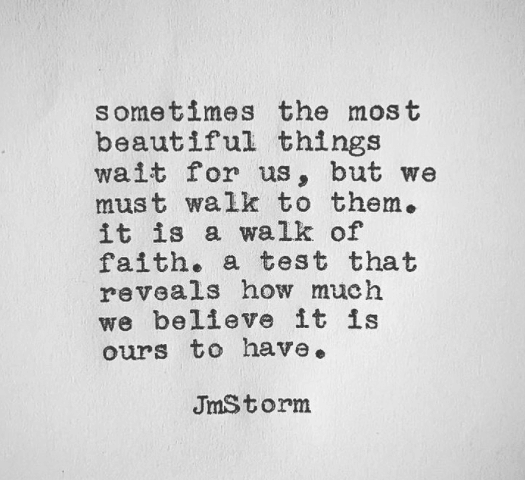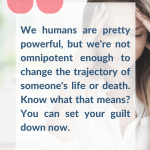Kick Widow Guilt to the Curb – Here’s How

Short and Sweet Summary: Guilt is an unnecessary byproduct of grief. If you feel doubt. shame, self-judgment or blame yourself for any number of things that you think you should have done differently, you’ve experienced widow guilt. It’s time to let that shit go.
Make no mistake about it…
You’re in a never-ending battle.
The battle between happy and sad.
You’ve been sad for so long it’s a constant companion. Sadness wraps itself around you like a wet blanket, weighing you down and limiting your movement until you absorb so much grief, you’re immobile.
Any time you try to offload the heaviness and vow to seek more enjoyment, sadness calls in its reinforcements. Whenever you start to feel an ounce of joy or elation, you’re hit with another wave of uneasy feelings.
That’s when sadness takes a backseat to its edgier, more evil cousin.
Guilt.
And widow guilt is a sneaky bitch.
WHERE DOES GUILT COME FROM ANYWAY?
So, let’s get right down to it: guilt comes from inadequate feelings.
It’s a defense mechanism that protects us from the perceived difficulties of moving forward. We trick our brains into thinking if we move forward we somehow “get over” our loss. We think if we invite happiness into our lives it means we’re no longer sad or grieving.
Which is total bullshit.
But, when we’re at our most vulnerable, that’s when widow guilt swoops in for the hit. Widow guilt says, “You can stay right here. You don’t have to feel better, live a fuller life or show any happy emotion. I will protect you from yourself.”
Widow guilt holds you down and expects you to stay there.
If you feel doubt, shame, self-judgment or blame yourself for any number of things that you think you should have done differently, you’ve experienced widow guilt. The crazy thing is, I convinced myself if I handled my husband’s cancer diagnosis differently, we might’ve had a different outcome. I mean, when I really stopped to think about it, he exhibited signs of his brain tumor for months prior to his diagnosis. Only I wasn’t paying attention.
Guilt is perhaps the most painful companion to death
Coco Chanel
If we diagnosed it earlier, could he have participated in different clinical trials? Could we have had more time? The “what ifs” and “should haves” used to keep me up at night because I was under the mistaken notion that I somehow controlled the universe. Like, if not for me he would still be alive.
Do you do the same? Do you feel guilty because you think you should have chosen a different hospital or doctor? Taken away his booze? Changed his prescription meds?
Somehow, we think we are so omnipotent and powerful that we SHOULD HAVE BEEN ABLE TO do something different to change the outcome. Because we search relentlessly for a reason or an explanation for the death, we end up blaming ourselves for things over which we had no control. And widow guilt stays right by our side.
DOES WIDOW GUILT SERVE A PURPOSE?
Guilt only serves a purpose if you truly wronged someone and you need to accept responsibility for your actions. If you made a legitimate mistake and need to make amends, guilt serves as the final push to get you to own up to your mistakes.
Other than that, guilt doesn’t serve much of a purpose other than to make us miserable and constantly second-guess ourselves. Widow Guilt is a natural byproduct of grief, but that doesn’t make it any less unpleasant. The reason it stays front and center in our grief journey is that we try so desperately to make sense of the senseless. We try to find answers, fixes, and a common-sense resolution.
The sad fact is no fix exists. Our person died. The unimaginable is now a reality.
So widow guilt keeps us from observing the true nature of our feelings. How dare I feel happy about anything. My person died! I can’t feel good about my accomplishments. Everything I’ve learned is because my person died.
Vacations become (quite literally) guilt trips. Instead of feeling happy about taking a much-needed trip, guilt reminds us that our loved one is dead and can’t enjoy the carefree moments with us. Insurance settlements are nothing more than blood money. Instead of feeling immense gratitude that you had a life insurance policy or some other death settlement, guilt reminds you that money represents death.
And finding love again makes you feel unfaithful. Instead of accepting that you are entitled to love and be loved, guilt convinces you that you’re cheating on your dead husband.
YOU’RE NOT A BETTER WIDOW FOR STAYING SADDER LONGER
So, what’s the moral of this story?

Widow guilt wants you to believe you owe it to your dead husband to be miserable.
Here’s the thing though…you’re not a better widow for staying sadder longer. Sadness has a place. No doubt.
But, guilt wants you to stay sad forever and ever. With no breaks. Because that’s where guilt lives – in the shadow of sadness. Widow guilt convinces you that as long as you stay sad you’ll forever honor your person’s memory.
Only that’s not how it works. That’s not how your spouse would’ve wanted it.
Widow guilt is a liar.
COPING WITH WIDOW GUILT
Of course, we grieve in different ways and on different timelines. Sadness and grief will be with us forever, but guilt doesn’t have to sabotage our healing. Without guilt, you are free to continue living because you woke up breathing today. You’re free to feel all the feelings including joy, elation, and love. You are allowed to be happy. Here are five solid ways to learn how to cope with your guilty feelings:
1. Identify and Label Your Feelings
The first step in learning how to cope with guilt is to identify it.
Label feelings of shame, doubt and self-judgment and identify the feelings associated with it. By writing down the feelings you can see the sabotage for what it is.
Look closely at your feelings and write down actionable steps to overcome the self-imposed label.
For example: “I feel shame for going on a blind date.” The feelings associated with shame could include embarrassment, disgust, and remorse. Now that you’ve labeled and identified the feelings associated with shame, how can you work to overcome that self-imposed label?
Instead of telling yourself that going on a blind date is shameful, how can you rewrite your story to be more positive?
- I like to meet new people. I’m a fun and intelligent conversationalist. I’m captivated when someone can keep up with my witty banter.
- I like getting dressed up. I deserve to be treated to a nice dinner. I’m happy when I go on blind dates because it’s fun.
- I like to flirt. Flirting makes me feel alive. I’m thrilled when someone finds me appealing enough to flirt back.
You don’t have to feel guilty for going on a date and having fun. Once you get to the root of your self-imposed label you can change it to suit your current wants and needs.
2. Forgive yourself for Not Controlling the Universe
You don’t control the universe.
Please forgive yourself for training your brain to believe you could change the outcome. We do the best we can with the information we have at the time. We can’t use hindsight as a barometer for making better choices in the past because we didn’t know what we didn’t know.
Repeat the following mantra: “I do the best I can with the information I have.”
It’s so easy to fall into the trap of blaming yourself. Instead of blame, practice forgiveness so guilt doesn’t take up unnecessary space in your life.
3. Accept that you are allowed to be happy
Just because the unimaginable happened to you doesn’t mean you’re destined to be alone, miserable, and unhappy forever.

The key is you have to believe it. How do you start believing you’re entitled to be happy?
Honor your worth.
You’re worthy of happiness, love, attention, adoration, joy, excitement and bliss. YOU ARE WORTHY OF ALL OF IT.
Why?
Because you woke up breathing today. You are alive and well. If you want to be happy, go be happy.
4. Practice gratitude for what you have now.
It’s hard to be sad and miserable all the time when you practice gratitude. A lot has gone wrong in your life, but I’m sure a lot has gone right, too.
Now’s the time to start focusing on what’s going right. Guilt can’t live where gratitude does. Don’t get me wrong, I wallow in sadness and misery, too. It’s human nature.
But when the weight of the misery is too much to bear, I think of everything I’m grateful for. It doesn’t take long for guilt to take a backseat to gratitude when I focus on the positive things in my life.
Some days I need to dig deep to find those positives, but I dig. And dig. And continue digging until I uncover the blessings in my surroundings.
5. Get Out of Your Own Head
We spend so much time focusing on our grief that it almost becomes second nature. We begin to accommodate guilt because it’s easy to pile on the grief.
It’s not enough to we feel sad, lonely or abandoned. Let’s pile on the bad feelings and add guilt to the mix. It’s hard work to feel better. Damn hard.
But when we spend so much time in our own heads we start to believe everything we think. Like, we’ll never feel better. Ever. Again.
So, go do something nice for someone else. Can you help someone else in need?
Or do something nice for yourself. Be productive.
Give your brain a break while you focus on something or someone else for a change.
WIDOW WRAP UP
It’s too much to pile guilt on top of the never-ending grief. Guilt doesn’t belong anywhere in your grief journey. It doesn’t serve a purpose other than to make you feel miserable.
You can kick guilt to the curb by simply reminding yourself that guilt comes from inadequate feelings. But, you don’t need to continually justify your actions, feelings or responses to anyone.
You are doing the best you can with the information you have right now. And you’re doing an awesome job.
Give yourself a break and remember: You are entitled to be happy. Being happy doesn’t mean you’re over your loss or that you’re done grieving. It just means you’re alive so you’re choosing to live.
Rock on.


Thank you for your wisdom ,
Grateful for you, Monica
Hi Monica,
You’re welcome. I appreciate your feedback more than you know!
What a great read. Almost as if you were in my mind. Thank you for sharing your opinions and lived experience. Sometimes it’s just what we need.
Thanks, Mathew!
Everything I’m going through.
Hard to see it in writing though. Wow.
Thank you for such honesty yet so much understanding..
Antonella
Antonella, here’s hoping you find a way to release it and be kind to yourself in the process ❤.
This is exactly what I needed to “hear”. My husband has been gone for 22 days. All I do now is tend to our daughter and volunteer as much as I can so I can escape the memories in our house. But in the evening, it’s impossible to escape them. I can’t stand to watch our favorite shows or movies. I can’t stand to work on our car as he taught me to. I can’t even change my sheets because then his scent will be gone for good. It’s so hard to enjoy anything without hating the fact I’m enjoying it without him. It’s nice to know I’m not crazy since others have felt this too
Hi Brittany, you’re still alive so you get to keep on living. It’s 100 % possible to grieve and miss your husband while also living a fulfilling life. But it takes time to settle in to your new reality (feel all the feelings, practice self-compassion, and shush your inner critic) before you’ll start to believe it ❤.
Thank you so much for posting this.it described everything I am feeling and I’m looking forward to getting rid of guilt.i choose joy in my life till I see him again
Hi Maria, I’m happy to hear you’re choosing joy in your life. You know the sadness doesn’t disappear. It just means that you get to decide how to think and feel about it ❤.
I want to thank you so much. I ran on this by accident. This year it will be 15 years l lost my beloved husband. I talk to him all a time. But I fallen in love with someone else. It was so hard to just keep it just a friend ship. I feel at so guilty at times. Everything you said has fit me so much. But now I know it’s ok to be happy. He will be with me always but the man in my world deserve all the love that is in me just like I gave my husband we we together 42 years.
God let me here for a reason.
Thank Gods Blessings
Hi Nan, you get to go on living while you’re still alive and that means it’s absolutely OK to be happy and in love and to do whatever else brings you joy 💛.